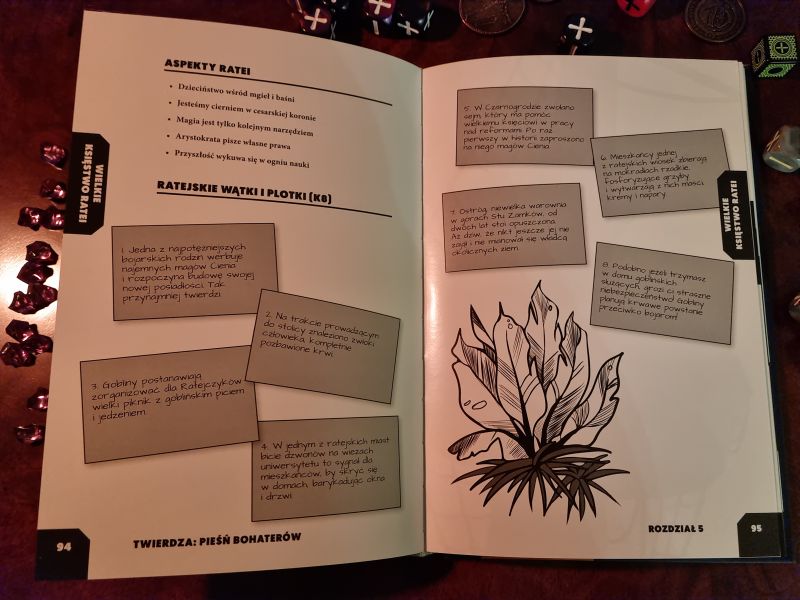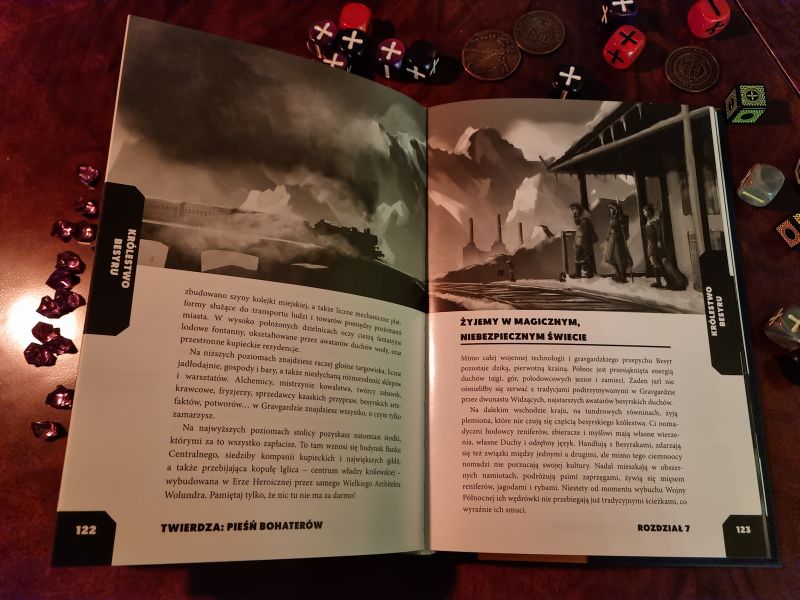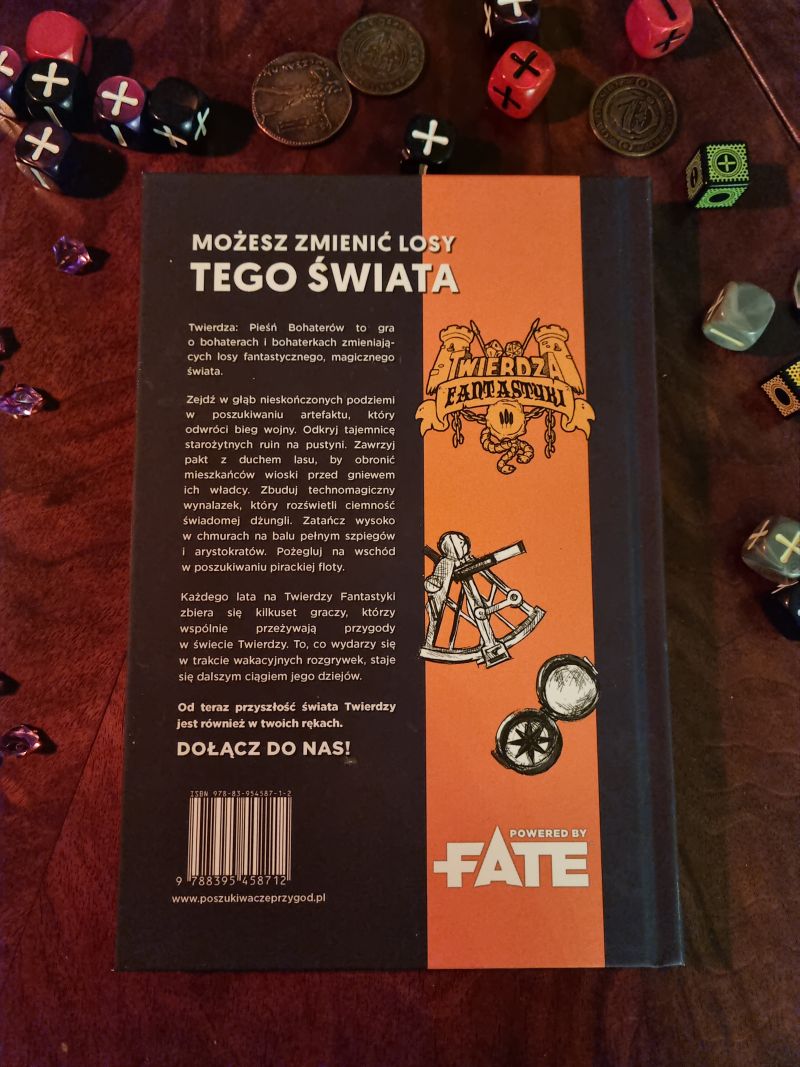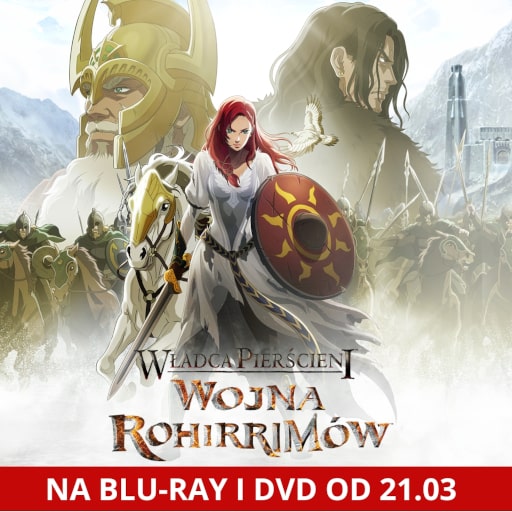A good tune with a few fake notes
The Song of Heroes was released in a compact, identical to Fate Core size. Visually, it refers to the original in every possible respect. The minimalist, monochrome design makes the textbook clear, and the pages of chalk paper make for a pleasant sensory experience while browsing them. It’s all locked in a hardcover with a nice blend of purple and orange. In general, the textbook is very familiar to you, but you can see a drawback of it at the first contact with it. No ribbon. This is a standard currently met by most publishing houses, and we will quickly notice its absence. Mixed feelings are also caused by the arrangement of this 200-page booklet.
On the one hand, it was a brilliant move to include links to pages with related topics or principles written in the main book, thanks to which the authors could briefly explain a particular aspect of mechanics without fear that it would be deprived of its proper context. In a way, moving around the Stronghold: Heroes’ Songs may be like playing a break game, which most of the RPG community likes. On the other hand, the order of the topics discussed here might be better.
It was undoubtedly a good move of the authors to make the first 15 pages correctly tell the reader what role-playing games are and what the book is about, but the decision to smoothly transition to the character creator is highly doubtful. Fate is a specific system that the characters of the players should be as deeply embedded in the world as possible. Which is also emphasized by the authors of the Song themselves. The key element of the hero is his aspect, and here specifically the “aspect of origin”, which should be selected from the appropriate table. The problem is that we have not yet had the opportunity to get acquainted with the places to which these aspects refer. It is true that each of them has links to the pages on which they are described, but in order to choose the most suitable one, you will probably have to read all of them. The more that this is an addition focused on setting. Perhaps the authors assumed that the users of this handbook would already be familiar with the world of the Fortress and hence the idea for such a layout. Unfortunately, for someone from outside the camps, that is probably for the greater part of the audience, it does not work very well.

Long ago, on a continent called the Fortress …
On the Besyrian Sea and the North Ocean you will find yourself freezing in the icy wastelands, while the coast of the Ribbon in the south of the continent is full of sandy beaches and lush vegetation …
We could hear a similar opening as an introduction to an anime series like Avatar: Legends of Aang , which would be an association quite close to the truth. The continent of the Fortress consists of five separate lands, distinguished primarily by climatic conditions and landscape, as well as the political system. They also differ in their approach to magic and technology. In other words, we are dealing here with a fabulous and diverse world straight from the most ambitious fantasy. Stronghold: Heroes’ Songfrom the beginning it is what it seems. It’s a fantasy adventure setting designed to be played at youth camps. A world full of contrasts, in which ancient and spiritual magic coexists with the technology of the future, can charm a less demanding reader as easily as it can irritate someone who seeks at least a little relative realism in fantasy. The creators tried to offer us a vision of a huge and epic continent and for this purpose its description was treated very globally. Consequently, thinking of the Stronghold, I have before my eyes a picture of a large space divided into five different regions, each of which will turn out to be monotonous and boring in the long run. I think that each of the lands could as well be the size of a city-state with adjacent lands, and from the perspective of the story, we would not feel much of a difference. Nevertheless, such an approach will probably not bother people who have first contact with paper RPGs.

A world like many
Reading the Fortress: Song of Heroes , we can get the impression that someone was trying to collect all the cool, high-fantasy stuff and pack them together, showing that in RPG only your imagination is the limit. This mix lacked only non-human playable character races. Such an assumption will be perfect as a support for epic adventures, during which we will travel the entire continent along and across. I am sure that the universe presented in simple language and the magnificence that fill it will be attractive enough, and at the same time not too overwhelming for an RPG novice . However, when it comes to more experienced players, they may be disappointed with what they find in the Stronghold. There are few revolutionary elements here, the world has been sketched quite briefly, and most of all it lacks something that makes it unique. Of course, this is both a disadvantage and an advantage. It is not overly defined, so it can be what the game master or players need at the moment. To sum up, Fortress: Song of Heroes works well as a textbook for someone starting their adventure with RPG, but for old stagers there will be no flavors that will attract their attention for longer.


